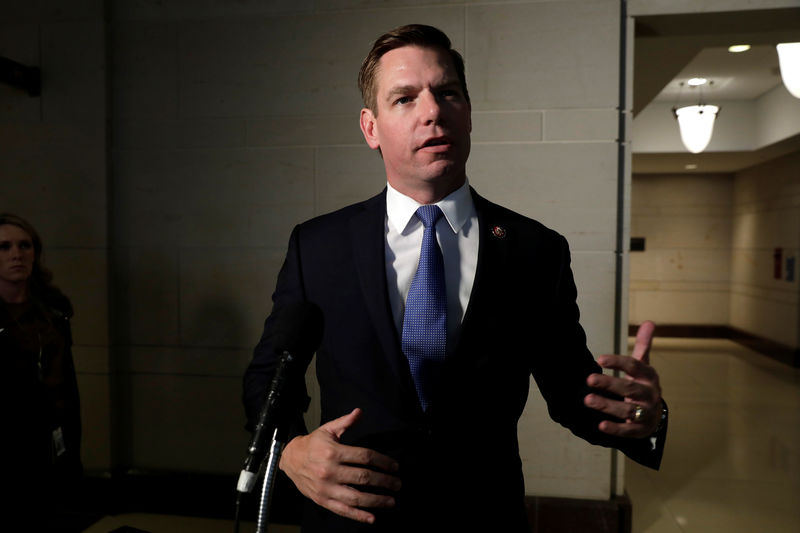By Mark Hosenball
WASHINGTON (Reuters) - Republican and Democratic lawmakers clashed on Tuesday over questions about the identity of the whistleblower whose complaint led to the impeachment investigation of President Donald Trump.
The skirmish revealed a growing dispute between the two sides, as Republicans say they need to hear from the intelligence official who initially raised the alarm over Trump's attempts to get Ukraine to investigate his political rivals in order to assess the whistleblower's credibility.
Democrats say the whistleblower's testimony is not needed at this point because it has been corroborated by other witnesses. Bringing him or her forward after repeated attacks by Trump would only put the whistleblower's safety at risk, they said.
"We have a long-standing concern that the president and his allies in Congress aren't interested in the underlying act but are interested in risking the life of the whistleblower," Representative Eric Swalwell told reporters.
Government personnel have been assigned to protect the whistleblower, according to sources familiar with the matter, after Trump has attacked the whistleblower and conservative news outlets and social-media activists speculated about the individual's identity.
As many as five possible names for the whistleblower have circulated in political circles, according to sources familiar with efforts to protect the whistleblower.
"Such behavior is at the pinnacle of irresponsibility and is intentionally reckless," the whistleblower's lawyers, Andrew Bakaj and Mark Zaid, told Reuters on Tuesday.
In a closed-door hearing on Tuesday, Intelligence Committee Chairman Adam Schiff cut off a Republican line of questioning of a witness, Army Lieutenant Colonel Alexander Vindman, objecting that it was designed to reveal the whistleblower's identity.
Republicans said they were trying to figure out who Vindman had spoken with after Trump asked Ukrainian President Volodymyr Zelenskiy to investigate Democratic presidential candidate Joe Biden in a July 25 phone call.
They said they do not aim to publicly reveal the whistleblower's identity but need to assess his or her motivations.
"It's tough to determine someone's credibility if you can't put them under oath and ask them questions," Republican Representative Jim Jordan told reporters.
After Vindman's testimony, Schiff accused Trump and his allies of seeking to "out," or reveal the identity of, the whistleblower and insisted that his committee will not allow that to happen.
"We will make every effort to make sure that notwithstanding the president or his allies' desire to out and exact political revenge on this whistleblower, that our committee is never used for that purpose," Schiff said in a brief statement to reporters, not responding to questions.
In previous sessions, Republicans have asked witnesses whether they know the person they suspect to be the whistleblower and inquired about possible motives, according to a congressional aide.

The whistleblower's lawyers have told congressional investigators their client is only interested in answering written questions.